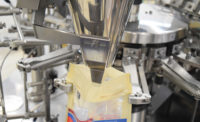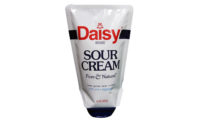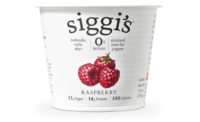It’s not surprising many dairy products launch in flexible packaging. It’s one of the fastest growing packaging formats in the United States, according to the Flexible Packaging Association, Annapolis, Md.
FPA’s 2016 State of the Flexible Packaging Industry Report pegged growth for the overall flexible packaging market at 2.2% for 2014-2015 and forecasts nearly equal expansion (2.1%) for 2015-2016.
Flexible packaging can differentiate products, offer sustainability benefits due to its light weight and deliver functional advantages, such as easier dispensing. Flexible packaging for dairy products includes an array of wraps and pouches. Although primarily film-based, foil or parchment also may be involved. For example, Minerva Dairy, Minerva, Ohio, hand-wraps four flavors of its Amish Roll Butter in parchment.
Pouches for single-serve, bulk products
Pouches with dispensing fitments are widely used for both single-serving and bulk volumes. With strong consumer demand for one-handed convenience and portion-controlled foods and beverages, single-serving, fitmented pouches are multiplying on store shelves.
The CleanPouch package, a pre-made spouted pouch from Scholle IPN Packaging, Northlake, Ill., is compatible with fresh or hot-filled products. Suitable for dairy-based treats like chocolate pudding, sizes range from 50 to 450 milliliters. Standard width measures 84 millimeters. The pouches run on existing filling lines where filling occurs through the fitment.
Two recent cultured dairy product introductions rely on fitmented pouches: whole-milk yogurt from Stonyfield Farm, Londonderry, N.H., and the shelf-stable GoGo squeeZ YogurtZ snacks from Materne North America Corp, New York, N.Y.
The free-standing, 3-ounce pouch for GoGo squeeZ YogurtZ snacks features a center dispensing fitment with a propeller-shaped, reclosable cap, which allows children to enjoy a nutritious and delicious snack without a spoon.
“The pouch makes our on-the-go snacks healthy and fun,” said Philippe Harousseau, chief marketing officer at Materne North America. A retort process and multilayer film/foil barrier packaging yields a shelf-stable product marketed as “So Cool, It Doesn’t Have to Be Cold.”
Produced at Materne’s facility in Chef du Pont, France, from milk sourced from a network of local dairy farms, the yogurt comes in three flavors: strawberry, banana and berry.
“Many of our farms are small, family-run establishments that have been passed down from generation to generation,” Harousseau said.
Sold in 4-pack windowed cartons, the yogurt has a 12-month shelf life from date of manufacture. An agreement with Terracycle, Trenton, N.J., collects pouches for recycling.
“We are excited about our ongoing partnership with Terracycle, which has given our consumers an opportunity to upcycle all of their squeezable snack food pouches and caps into new products, since 2011. To date, we have collected over 2 million pieces of waste across over 7,500 participating locations,” he said.
Milk in a bag
Demand for large-volume products such as bulk milk or dairy ingredients continues to be strong, spurring use of bulk bags and bag-in-box designs. Liqui-Box, Richmond, Va., a supplier of bulk bags, is installing three high-capacity, multilane bag machines and one single-lane bulk bag production line. The new equipment is slated for its Sacramento, Calif., and Ashland, Ohio, manufacturing locations.
A customized, tamper-evident fitment for bulk bag-in-box packaging streamlines smoothie preparation for quick-service restaurants. The Scholle IPN QuickSeal Sentry SafeLock fitment ensures error-free connection to the dispensing equipment and leak-free bag removal during changeover or cleaning. The pre-made smoothie mix/dispenser combination reduces handling, prep time and waste while maximizing operational efficiency, product consistency and consumer satisfaction.




